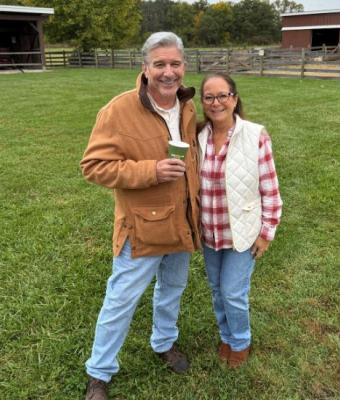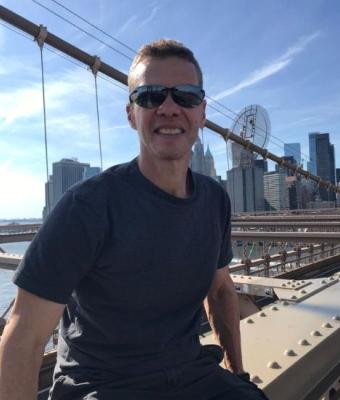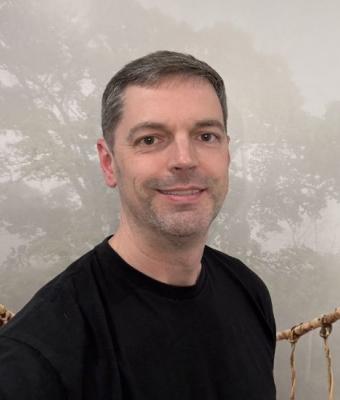My PD Story
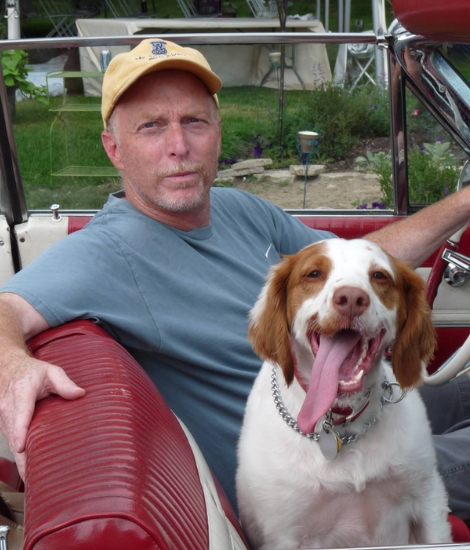
Joe Staub
For a long time, I knew something was wrong. Deep down inside I knew. My handwriting was getting bad, I had a tremor in my hand, my arms no longer swung when I walked, and I had trouble standing and walking because of my balance. I didn’t want it to be true. I prayed that it was not.
The first 10 years of my marriage was spent helping my Dad. He had Parkinson’s disease (PD). I did all the normal things a son would do. I did yard work, took him for haircuts and ran errands. I helped when I could. I was raising a young family myself and only had so much time.
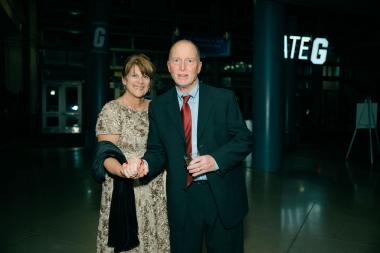
We talked about support groups and clinical trials. He was set in his ways, hard and not willing to give. He told me that for him, going to a support group was like looking into his future. He didn’t need it.
Suddenly, my wife’s mother was diagnosed with Parkinson’s. I saw all the early signs and steady decline. I witnessed firsthand the impact and demands of being a primary caregiver that were placed on my wife.
I finally got up the courage to stop ignoring my symptoms. I had had enough of lying to myself and hiding it from others. It was time to get this out in the open. I have Parkinson’s disease. There, I said it. As it turned out, it was not a surprise to those who know me best.
The diagnosis was devastating, expected, but none the less devastating. I accepted it, after all I had been preparing myself for some time. What I didn’t expect, was the guilt I felt for my wife. I didn’t care about myself, but rather why was this happening to her? She cared for me and our family as we helped my dad. She cared for her mother for all those years, and now she was literally going to be caring for me. The guilt was overwhelming!
I was surprised; the basic treatment of Parkinson’s had not changed much since my dad’s diagnosis in the late 1980’s. A lot is now known and there are many new treatments to eliminate or reduce the symptoms. But for all intense purposes, you treat the symptoms. Slowing or halting the progression of this disease is still in the future. Everyone I talked with said, the single most important finding was to keep moving. If anything seems to slow the progression, it’s exercise.
My father and my mother-in-law both laid down and accepted it. I was not going to go without a fight. I was going to make the best of this situation. I am a firm believer that each life event is preparation for something else that will happen in your future. I am young, and in relatively good health, no heart problems, no cancer, good vitals and active. Surely, I’ve been placed into this position for a purpose?
As is her passion, my wife (she’s a librarian) immediately jumped into research mode. We set out to find the right doctor for us, and she started exploring emerging treatments and therapies. That lead us to clinical trials.
I knew nothing about clinical trials. How to find one, what was involved, what was expected, how long they lasted, the screening process, the commitment, the potential risks, the potential benefits and least of all what it would mean for me.
There are many places to look for clinical trials:
-
Parkinson’s Foundation Join A Study page
-
The Quest Research Institute, where our research took us.
Once we contacted Quest, there was a screening process and a series of questions asked over the phone to determine if you are a potential candidate for a trial.
If you meet the criteria, you are invited to continue the qualification process, and an office visit is scheduled. The initial visit is generally a review of the information provided during the screening call and a physical exam.
An Informed Consent document is provided, which provides a detailed description of the specific clinical study. This tells you exactly what to expect and what is expected of you.
Assuming the screening process goes well, and you sign the consent form, a schedule is developed to meet the trial’s protocol. This details what is being done and when it will be. Phone calls, office visits and procedures. This schedule is different for every trial and reflects the study’s requirements and goals.
My PD research experiences have always been positive, I have received:
-
Early access to the newest drugs and therapies.
-
Access to expert medical care by physicians who are focused on advancing the treatment of Parkinson’s and have your best interest in hand and understand the ups and downs of PD.
-
Met others Parkinson’s patients on a similar journey, compared notes, created new friendships, realize that I’m not alone.
-
I have seen others that are in subsequent phases of a drug trial. Knowing I helped move that drug along earlier in its approval cycle.
As a patient volunteer in several trials, I have participated in simple trials that required a single office visit, drug studies that lasted 1 to 3 months and required several overnight stays and even completed a trial that required a 30-day inpatient stay.
I’ve got to tell you, my own fears and anxieties about doctors and medical procedures cause me more stress than the actual examination and procedure. I have consented to having my vitals taken, EKG’s, blood draws, CAT scans, MRI’s, DAT Scans, IV infusions and Lumbar Punctures. Not to mention the psychological evaluations and cognitive testing, which are more unnerving for me than any medical procedure!
Did you know that one of the biggest reasons bringing a new drug to market takes so long is the lack of patient volunteers to participate in clinical trials?
"Next to marrying my wife and fathering my children, participating in clinical trials is the single most rewarding accomplishment in my life."
I never expected this. I don’t do this to be the recipient of the advancement, but so others won’t have to endure this journey. I don’t kid myself. My Parkinson’s is progressing, and the development and approval of new drugs is a time-consuming process. This is my purpose!
My participation in clinical trials, overcoming my fears and anxieties, contributing to the advancement of a cure and knowing that my contribution to the Parkinson’s community may someday prevent others from having to walk this same path is my single greatest moment.
My wife and I act as a mentor team (person with PD and caregiver) for the newly diagnosed. We participate in a mentorship program and regularly learn from and reference Parkinson.org in emails and as resources to our mentees.
So, I end this by asking you to please consider volunteering for a clinical trial. We are on the verge of a cure. We need those both with and without Parkinson’s. Without your support, progress toward our common goal, a cure, will be slow in coming.
Learn more about ongoing Parkinson’s research and visit our Join a Study page to explore PD studies that are currently enrolling.
Related Materials
More Stories
from the Parkinson's community
